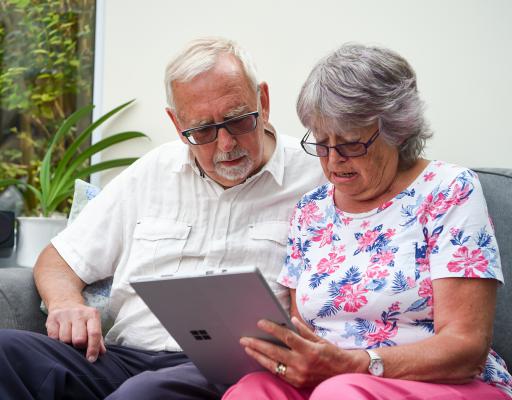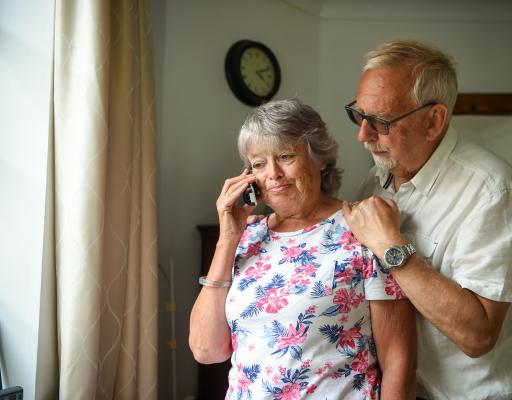What to do if things go wrong
We know that undergoing treatment following a brain tumour diagnosis can sometimes feel scary, and you might worry about what will happen. In most cases, your treatment and care will go smoothly, with open and honest communication and support throughout. However, sadly we know that this isn’t always the case, so it’s really important to know what you can do if you feel like things are going wrong.

First steps
First and foremost, if you’re unhappy with your treatment or care, the best thing to do would be to talk to your medical team about how you’re feeling. We know that this can sometimes be a bit daunting, but it could save you a lot of time and effort compared to making a formal complaint. And don’t worry, raising your concerns with your healthcare team won’t mean they think you’re a nuisance or affect your treatment. It’s just a chance to share how you’re feeling and have the experts work with you to resolve any issues.
Macmillan have a really great toolkit of suggestions about how you can prepare for these conversations, which you can read about here: https://www.macmillan.org.uk/cancer-information-and-support/get-help/raising-your-voice-toolkit/challenging-conversations
PALS (Patient Advice and Liaison Services)
Although in most cases talking to your medical team will help resolve your issues, sometimes you might feel like you need to do more to solve the issue. A useful next step would be to speak to the Patient Advice and Liaison service (PALS). PALS is a service within hospitals that can provide confidential advice, support and information for you.
They can also help you resolve problems within the NHS, without having to make a formal complaint. They can talk to hospital staff on your behalf, deal with your problems in confidence and listen to your suggestions for improving services. They can also help and give you advice on making a formal complaint if the situation calls for it.
PALS can be particularly helpful if you have an immediate concern, or something that needs resolving quickly, so don’t hesitate to reach out to them.
Making a formal complaint
If you feel like you haven’t reached the resolution you’re looking for with the steps above, you might feel like you need to make a formal complaint under the NHS complaints procedure. There are a couple of ways that you can do this:
- Complain to the healthcare provider: this will be the organisation that you received your treatment or care at. So for example it could be your hospital or perhaps your GP surgery
- Complain to the commissioner: this is the organisation that pays for the service or care you received. This will differ depending on what service you’re making a complaint about. We’ve explained some of the different ones below:
- Primary care services, such as GP surgery, opticians, pharmacy services. You would need to complain to NHS England.
- If your complaint is about services like hospital care, mental health services or community services like district nursing, you would contact your local clinical commissioning group (CCG)
- If you’re complaining about public health organisations, then you would need to contact your local council
There are a few different ways that you can make your complaint:
- In writing
- By email
- Speaking to someone in person
It’s important that you make your complaint within 12 months of the incident. In some situations this time limit can be changed, but it will depend if the issue can still be investigated. To be safe, you should make your complaint as soon as possible after the issue.
If you don’t feel like you can make the complaint yourself, anyone can do this for you as long as they have your permission.
Every complaint made about treatment or care within the NHS should be looked into and acknowledged properly, and you should be kept informed of any progress or outcomes along the way.
And remember, if you’ve had to make a complaint, your treatment and care cannot be affected as a result of this. You should always be treated fairly, politely and with respect.
If you’re not happy with the outcome of your complaint, you can take things further by contacting the Parliamentary and Health Service Ombudsman (PHSO). This group make the final decision when there’s an unresolved complaint, and is an independent service. To make a complaint to them you can visit their website here, or give them a call on 0345 015 4033

Getting help with your complaint
Independent Advocacy Services
If nothing else has worked and you need to make a formal complaint, know that there are organisations that can help you with this – you don’t have to try and do it alone. There are also independent NHS Complaints Advocacy Services that can help you with your complaints. They can attend meetings with you, help explain the process and go through information given to you at different points of the procedure. It’s never too late to reach out for some extra help, so don’t worry if you’ve already started the procedure. You can find out who your local advocacy provider is through your local council.
Healthwatch
You can also contact your local Healthwatch, who are an independent statutory body that work with the community to share feedback with NHS and social care providers to make change. However they can also help by giving you advice and information to make sure that you are accessing the support and care that you deserve.
You can find your local Healthwatch by visiting their website here: https://www.healthwatch.co.uk/…
Talking to others
It can help to understand what other people have done in similar situations, to learn from them and feel more informed about your choices. To help you do this, we have brilliant online support groups to connect people following a diagnosis. You can read more about them here: https://www.thebraintumourchar…
Here are my top tips if your surgery is not happening. Complain to PALS and speak with the hospital if there is a lack of feedback (or none) from Neurology. Contact your local MP as they may get involved in your case. You could think about going to your local newspaper with your story. And finally, contact your GP and get them on the case too.
Nicola, whose husband is living with a brain tumuor and has been struggling with delays to his treatment, shares her top tips to help others in this situation.
Support and Information Services
Research & Clinical Trials Information
You can also join our active online community.
In this section

Get support
If you need someone to talk to or advice on where to get help, our Support and Information team is available by phone, email or live-chat.
